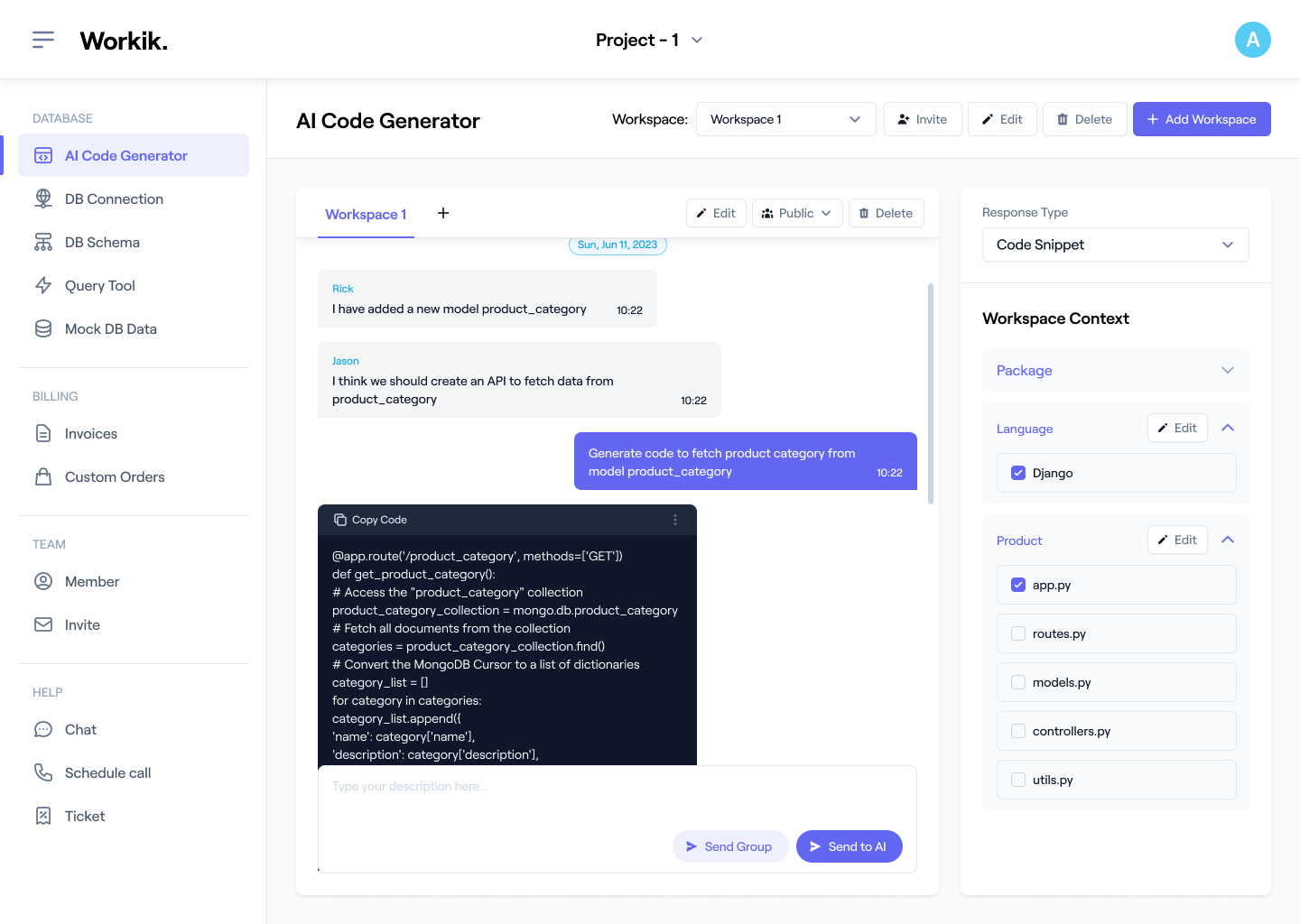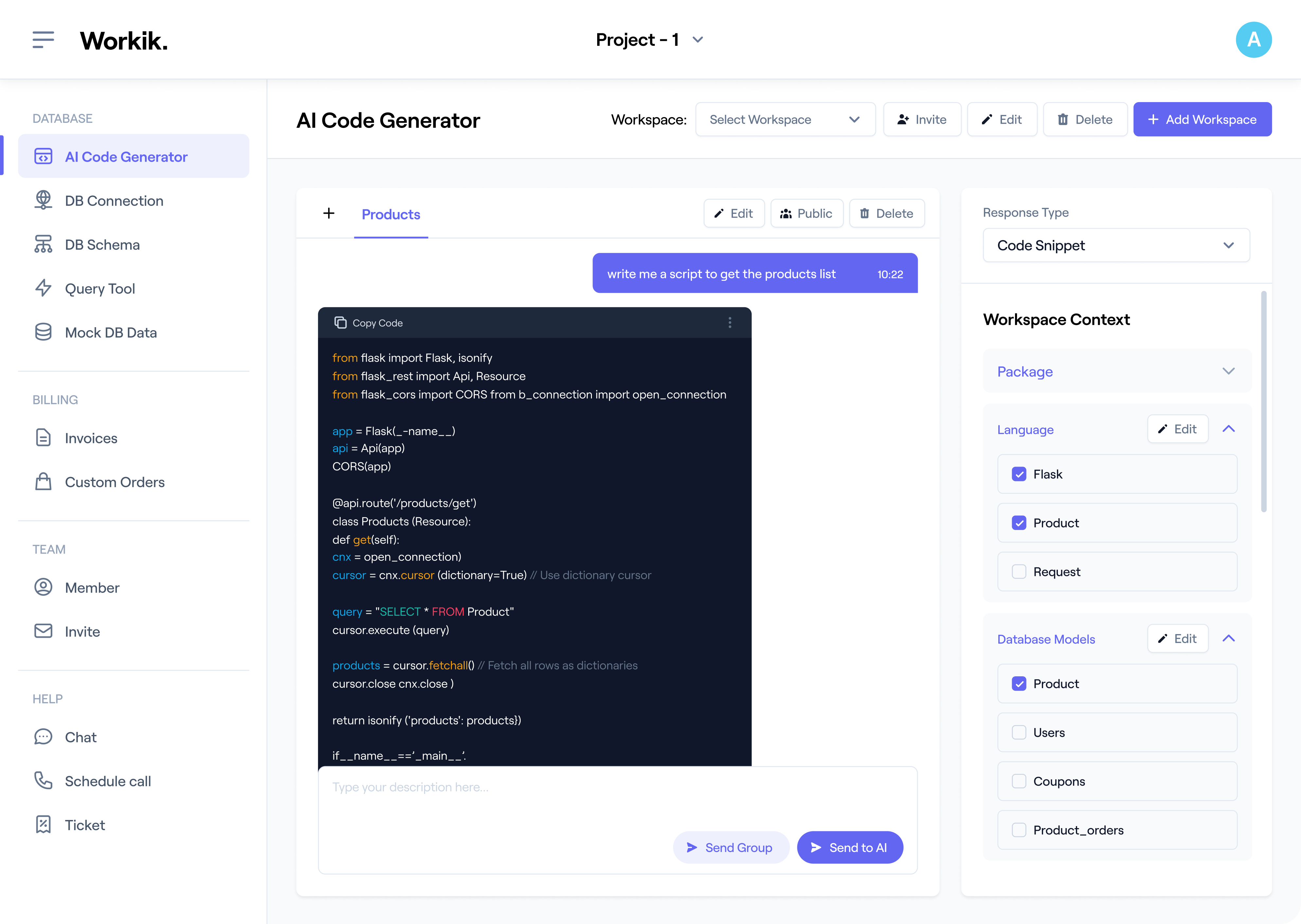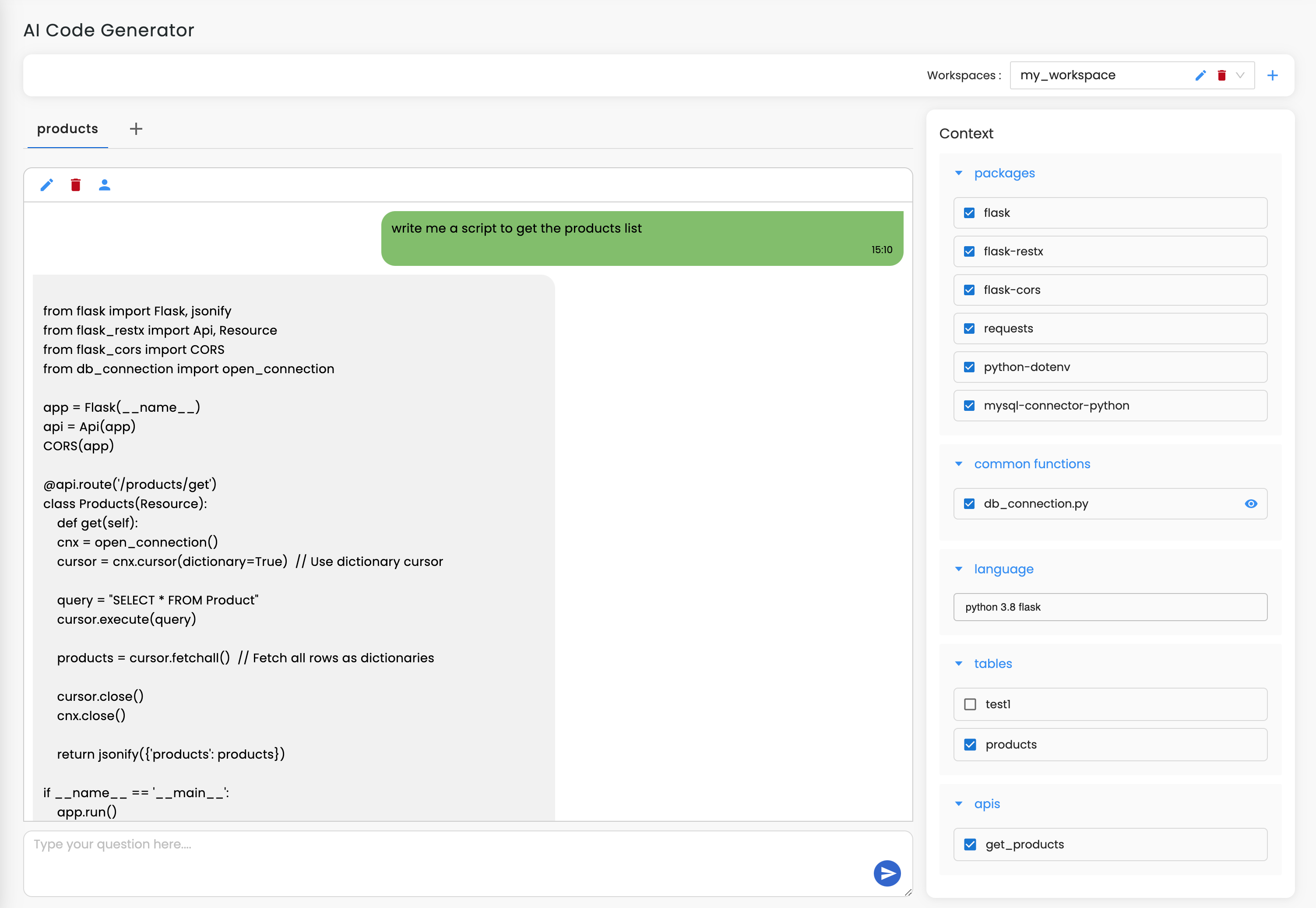
Join our community to see how developers are using Workik AI everyday.
Features

Automate JSON to YAML in CI/CD
AI helps to integrate with GitHub or GitLab to convert JSON to YAML for Kubernetes or Docker Compose.

Optimize YAML for Compatibility
AI validates and restructures YAML files for tools like AWS CloudFormation and Kubernetes to reduce errors.

Convert API Schemas Instantly
AI can transform JSON-based Swagger/OpenAPI specs into YAML to ensure compliance and clarity.

Simplify Multi-format Files
AI batch converts JSON to YAML for Terraform or CI/CD pipelines with PyYAML support.
How it works
Create your Workik account in seconds and start transforming JSON to YAML effortlessly.
Import JSON files from GitHub, GitLab, or Bitbucket. Define schemas, API structures, or CI/CD pipelines for precise YAML generation tailored to your workflow.
Leverage AI to batch convert, validate, and optimize YAML files. Ensure schema compliance for tools like Kubernetes, Terraform, or AWS CloudFormation.
Share AI-generated YAML files with your team in Workik. Manage platform-specific configurations seamlessly and integrate YAML directly into your pipelines.


Expand
.png)
.png)
Expand


Expand


Expand


Expand


Expand


Expand


TESTIMONIALS
Real Stories, Real Results with Workik
Workik AI transformed my workflow! I batch-converted hundreds of JSON files into YAML for our Kubernetes setup in minutes.

Alex Carter
Senior DevOps Engineer
Workik’s JSON to YAML converter made OpenAPI spec generation seamless and error-free.

Nina Carter
Backend Developer
I used Workik AI to optimize YAML for Terraform scripts. The validation and formatting features saved me hours of manual adjustments!

Jacob Lee
Cloud Infrastructure Architect
What are some popular use cases of Workik AI-powered JSON to YAML Converter?


Workik AI-powered JSON to YAML Converter is widely used across various development workflows. Some popular use cases include but are not limited to:
* Convert JSON API schemas (e.g., Swagger/OpenAPI) to YAML for API management and documentation.
* Generate YAML configurations for Kubernetes, Docker Compose, and CI/CD pipelines.
* Transform JSON structures into YAML for Terraform and AWS CloudFormation templates.
* Optimize YAML files for Kubernetes or server configurations.
* Validate YAML syntax and ensure schema compliance with PyYAML.
* Streamline multi-cloud setups, ensuring consistency across providers like AWS, Azure, and GCP.
What context-setting options are available on Workik for JSON to YAML conversion?


Workik allows various context-setting options for JSON to YAML conversion like:
* Connect GitHub, GitLab, or Bitbucket repositories.
* Upload JSON files to refine and standardize YAML outputs.
* Import API blueprints to generate YAML-based API schemas for OpenAPI.
* Define Kubernetes manifests or Helm charts for precise YAML generation.
* Add Terraform templates to tailor YAML outputs for IaC requirements.
* Specify frameworks like AWS SDK or GCP libraries to align YAML with cloud-specific tools.
How can Workik AI help with configuration migrations from JSON to YAML?


For example, when transitioning an application from a Node.js Express setup to Kubernetes, Workik automates the conversion of JSON server configurations into YAML manifests, ensuring error-free deployment.
Can Workik optimize YAML for microservices architecture?


Yes, Workik AI excels by detecting redundant fields and aligning configurations with best practices. For instance, it can generate service-specific YAML for API gateways, load balancers, and inter-service communication, ensuring smooth microservice deployment on platforms like Kubernetes.
How does Workik AI handle advanced schema relationships during JSON to YAML conversion?


Workik intelligently processes nested JSON objects and converts them into readable, structured YAML hierarchies. For example, when dealing with hierarchical data for multi-region Terraform setups, AI ensures accurate indentation and hierarchy representation, reducing manual rework.
Can Workik AI assist in YAML validation for DevSecOps?


Absolutely! Workik AI validates YAML files for security compliance in CI/CD pipelines. For instance, it checks Kubernetes YAML manifests for vulnerabilities like open ports or insecure configurations, enhancing security for DevSecOps teams.
Can Workik AI handle YAML file versioning and updates?


Yes, Workik AI tracks changes to YAML configurations and supports version control. For example, if you update a JSON-based API schema, Workik automatically reflects those changes in the corresponding YAML files, ensuring that version histories align with GitHub, GitLab, or Bitbucket repositories.
Generate Code For Free

JSON to YAML Conversion: Question and Answer
JSON to YAML conversion is the process of transforming data from JSON format, widely used for APIs and configuration, to YAML format, preferred for its readability in configuration files. YAML’s hierarchical structure makes it ideal for tools like Kubernetes, Docker Compose, and CI/CD pipelines, enabling clear and concise definitions for complex workflows.
Popular tools and frameworks used in JSON to YAML conversions include:
API Management:
Swagger/OpenAPI, Postman
DevOps:
Kubernetes, Docker Compose, Terraform
Scripting:
PyYAML, JSON2YAML (npm), YAML.js
Version Control:
GitHub, GitLab, Bitbucket
Cloud Platforms:
AWS CloudFormation, Azure Resource Manager
CI/CD Pipelines:
CircleCI, Jenkins, GitLab CI/CD
Popular use cases of JSON to YAML conversions include:
Retail:
Configures e-commerce platforms and payment gateways.
Healthcare:
Manages API deployments and compliance workflows.
Finance:
Automates cloud deployments and CI/CD pipelines.
Logistics:
Handles route optimization and shipment tracking systems.
Media:
Deploys streaming platforms and API workflows.
Education:
Configures cloud-based learning platforms.
Telecommunications:
Manages network configurations and customer portals.
Government:
Supports scalable public data and citizen services.
Career opportunities and roles include DevOps Engineer, Cloud Infrastructure Architect, API Developer, Backend Developer, Configuration Manager, CI/CD Specialist, Kubernetes Administrator, Cloud Engineer, and YAML Configuration Specialist.
Workik AI provides comprehensive assistance for JSON to YAML conversions, including:
Automated Conversion:
Converts JSON files to YAML in seconds, maintaining data integrity.
Batch Processing:
Processes multiple JSON files into YAML simultaneously for large-scale deployments.
Validation:
Ensures YAML syntax accuracy and compliance with tools like Kubernetes and Terraform.
Schema Optimization:
Restructures YAML for clarity and performance, optimizing nested hierarchies.
CI/CD Integration:
Generates YAML configurations for pipelines directly from JSON templates.
API Blueprint Handling:
Simplifies the conversion of Swagger/OpenAPI JSON to YAML for APIs.
Error Detection:
Identifies inconsistencies in YAML and suggests fixes to improve configurations.
Deployment Readiness:
Creates deployment-ready YAML for Kubernetes, Docker Compose, or cloud services like AWS.
Explore more on Workik
Get in touch
Don't miss any updates of our product.
© Workik Inc. 2026 All rights reserved.

